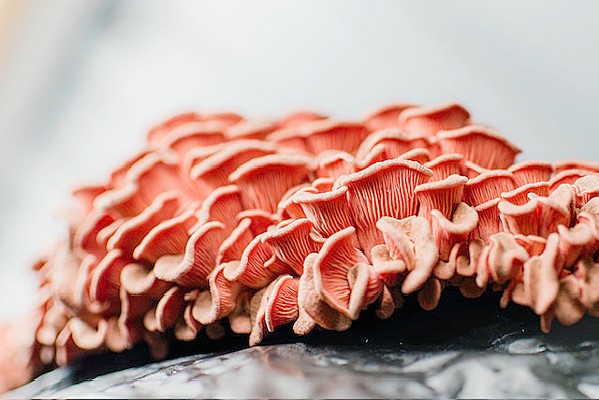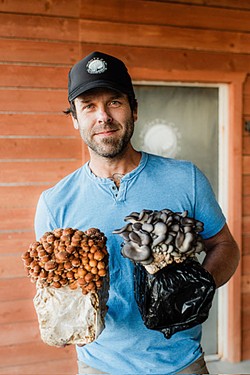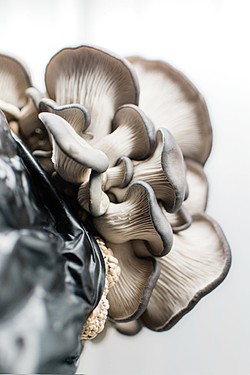California mushroom growers are backing a bill that would only allow mushrooms that are fully cultivated in the state to bear 'California Grown' stickers
By Bulbul Rajagopal[{
"name": "Ad - Medium Rectangle CC01 - 300x250",
"id": "AdMediumRectangleCC01300x250",
"class": "inlineCenter",
"insertPoint": "8",
"component": "2963441",
"requiredCountToDisplay": "12"
},{
"name": "Ad - Medium Rectangle LC01 - 300x250",
"id": "AdMediumRectangleCC01300x250",
"class": "inlineCenter",
"insertPoint": "18",
"component": "2963441",
"requiredCountToDisplay": "22"
},{
"name": "Ad - Medium Rectangle LC09 - 300x250",
"id": "AdMediumRectangleLC09300x250",
"class": "inlineCenter",
"insertPoint": "28",
"component": "3252660",
"requiredCountToDisplay": "32"
}]
Mushroom growers across California are fighting to keep the fungi bearing the state's name 100 percent local.
Introduced by Assemblymember Dawn Addis (D-Morro Bay) on Jan. 12, Assembly Bill 1833 aims to make the production and sale of mushrooms bearing "California Grown" or "California Mushroom" stickers unlawful unless they were developed from scratch in the state. California is the second-largest producer of mushrooms in the country following Pennsylvania.
"So many people have no idea how much of the mushroom industry is imported from overseas, specifically from China, Australia, Canada," Mighty Cap Mushrooms founder Chris Batlle told New Times. "My own research has found that roughly about 80 percent of the mushrooms globally grown are overseas for the United States."
Along with being growers, Batlle and his team at Mighty Cap in Paso Robles educate their visitors about the dedicated, time-consuming process of growing mushrooms. It involves a series of precise steps that many large commercial companies cut corners on.
Typically, growers inoculate substrate blocks—bricks made from sawdust, grains, and organic matter that boost the properties of soil and compost—with mycelium strains from which the fungi eventually develop.
According to Batlle, growers outside the U.S. refrigerate those blocks, put them in sea train containers, and ship them overseas. Industrialized commercial mushroom farms buy these premade blocks and put them in fruiting chambers, he said. The blocks sprout mushrooms within five to 10 days, which help the large farms churn out thousands of pounds of mushrooms a week.
"But because they buy the blocks and then actually grow the mushroom part here in the States, they've been calling it a domestically grown mushroom," Batlle said. "Mind you, ... a small part of that's only been done in the states."
Curating the blocks from scratch is expensive, especially on a small scale. It's reflected in the price points for customers. Batlle told New Times that foreign-grown mushrooms available in grocery stores cost $3 or $4 a pound, whereas Mighty Cap mushrooms cost $15 a pound. While truly locally grown mushrooms cost more, they're higher-quality products with longer shelf lives, he said.
It's a point of frustration for Batlle that no regulation currently exists to monitor how mushrooms are labeled.
"They're still filling a huge market ... so it's kind of hard to blame the big mushroom farms that are doing it," he said. "But we think that it should be separated. ... We spend a lot of money here because it's not cheap to live in California by any means."
Batlle isn't alone in advocating for AB 1833. At the end of 2023, Moss Landing-based gourmet mushroom provider Far West Fungi focused its attention to the labeling problem. Far West Fungi is one of the sponsors of the bill along with California Certified Organic Farmers (CCOF). They've gathered several California mushroom growers to increase awareness about the labeling practice and garner support.
Erin Raser, the director of operations and advocacy at Far West Fungi, said that the labeling issue has been on the company's mind since at least 2019. But she got inspired to challenge it while attending the 2023 EcoFarm Conference.
"I was in a policy discussion, and it was brought up that maybe we could make some headway here at the state level," she said. "For just about one year, we've been talking to different policymakers and also working with the policy director at CCOF who's been super helpful with navigating us through the legislative process."
If lawmakers pass and enact the bill, Raser and her husband, Product Manager Kyle Garrone, hope the changed labeling system will offer consumers a way to tell the difference between fully locally grown mushrooms and imported ones.
"I think the immediate action also for the mushroom growers is that it's a marketing tool that we can use to show that we stand out in the marketplace," Raser said.
Assemblymember Addis told New Times that the bill could be enacted as early as next January. From then on, the California Department of Food and Agriculture will fine people flouting the labeling rules $5,000, $10,000, and $20,000 for the first, second, and third and subsequent violations, respectively.
Fostering transparency through a revamped mushroom labeling system holds benefits for both growers and consumers, according to Addis.
"There's starting to be more and more evidence that local food systems have lower rates of foodborne illnesses and higher nutritional contents," she said. "Just from a community building standpoint: think about going from farm to table, going to farmers markets. Knowing your food producers has real positive benefits on social health or community health."
Addis added that she envisions bipartisan support for the mushroom bill because it supports small farmers and businesses across the state. Following review from the Fiscal Committee, the bill will undergo hearings in the Assembly and Senate.
Community interest in the mushroom bill underscores California's leadership in an arena called "truth in labeling," according to Addis. It mirrors concerns about labeling practices for other products like wine, olive oil, and cannabis.
"There's a huge demand for mushrooms, and it's a growing demand that's become more and more popular both medicinally and as food," Addis said.
The escalating interest in mushrooms also means there are gaps in people's knowledge about the crop that they're looking to fill. That's where groups like Far West Fungi and Mighty Cap step in with educational tours.
"Mushroom farming is somewhat relatively new to the U.S. in many ways. It's gotten a lot of publicity over the last several years, and it's what we call 'shroom boom,'" Batlle said. "It comes down to supporting local. ... Mushroom farming is harder than regular traditional farming because it never stops. We grow all indoor rain or shine. So, when you get to a certain scale, there's no turning off the faucet." Δ
Staff Writer Bulbul Rajagopal is pumped for mushroom school. Send notes to [email protected].
Latest in Flavor
Comments (9)
Showing 1-9 of 9












